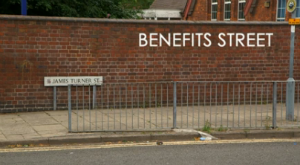The Revd Steve Chalke chaired a public meeting on Wednesday for residents of Winson Green in Birmingham - the neighbourhood featured in the controversial
Benefits Street.

The series follows the lives of those who live in James Turner Street, and hit the headlines after appearing to show acts of criminality and anti-social behaviour.
The first episode (6 January) coincided with the street’s primary school becoming the latest school in the Oasis stable, the Oasis Academy Foundry. Oasis is a charity founded by Mr Chalke and responsible for 39 schools across the UK. The word's "Benefits Street" are projected onto the school's wall during the opening credits
(pictured).
Wednesday’s meeting was being held in the school, and was, he told
The Baptist Times, an opportunity for the residents to have their say.
‘Of course we are not saying they are all saints, that crime doesn’t happen - but this is what you find on many streets up and down the country. This is a good community.
‘There are other stories to tell. I am determined that the local community – which Oasis works in - has its chance to put the record straight and celebrate what we love about Winson Green. This community deserves a right of reply.’ Following the meeting it was announced that a
live Question Time-style debate would take place at the end of the series on 3 February, hosted by Channel 4 and chaired by Richard Bacon.
The series has revealed benefit fraud, theft, drug taking and anti-social behaviour, and has been the most popular show on C4 this year in terms of viewers. It has divided opinion and led to death threats to participants.
An
online petition calling on the broadcaster to axe the series has been signed by 44,000 people. In a statement C4 described it as a ‘fair and balanced observational documentary series is a fair reflection of the reality of life on a street where the majority of households receive benefits.’
But Mr Chalke said it was ‘a completely irresponsible piece of television’ designed for ratings and advertising revenue – which has had a devastating short term effect and would leave an unwanted legacy for the community.
‘The programme is intentionally designed to misrepresent, denigrate and distort the image of the local neighbourhood,’ he said.
'‘The community is outraged. They feel they have been abused – and are turning on themselves. Some of them have received death threats. Our teachers are taking the children to school because the parents are scared to go out.’
He added, ‘The very real point is that Ofsted will come to this school. They will be asking – do these kids have hope? Do they believe they can achieve? And they’ve just been told they live on one of the worst streets in Britain. It’s our job to give them hope. And it does happen.’
Elsewhere the programme was criticised by the Joint Public Issues Team of the Baptist Union of Great Britain, the Methodist and the United Reformed Church.
It highlighted a popular but false stereotype of benefit claimants: the ‘belief that being on benefits is about tattoos, Sky TV, cigarettes and an obligatory widescreen telly’,
wrote Paul Morrison in a blog on Tuesday… yet ‘it wasn’t even representative of the people on the street.’
‘Just one example of this is that entirely predictably the majority of people on the street who aren’t in work are pensioners, the next largest group are the sick and disabled and after that are the unemployed – yet the programme equates benefits with those who are unemployed.’